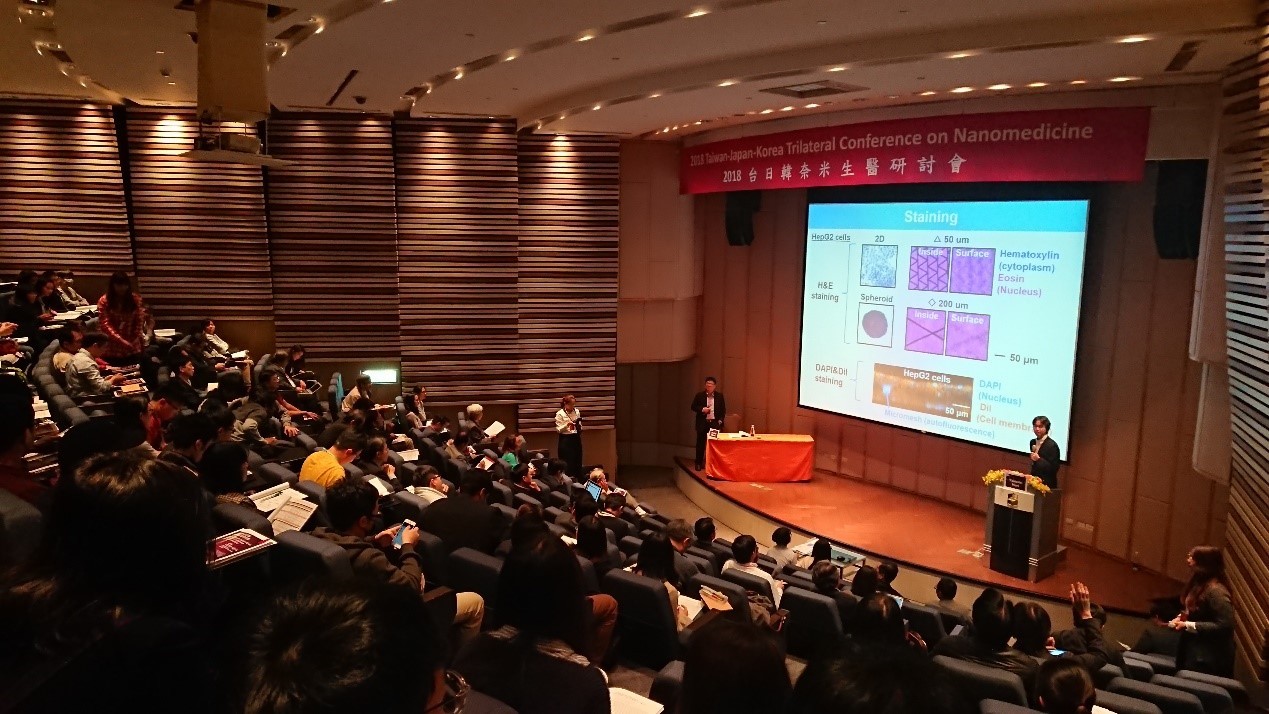The 2018 Taiwan-Japan-Korea Trilateral Conference on Nanomedicine was held at NCKU

The 2018 Taiwan-Japan-Korea Trilateral Conference on Nanomedicine was held on December 13th and 14th in the International Conference Hall at Tainan's Shangri-La Hotel. The opening ceremony was held at 10 a.m on the morning of the 13th. This conference was held by the National Cheng Kung University Center of Applied Nanomedicine, the Research Center for Applied Sciences, the Taiwan Nanomedicine Society, and National Cheng Kung University's Global Research and Industry Alliance. The conference invited esteemed scholars in the field of nanomedicine from the Asia-Pacific region including Japan and Korea to present papers, in order to increase Taiwan’s research capability in the field of nanomedicine and to facilitate mutually cooperative exchange. The introductory remarks for the opening ceremony were presented by the Dean of National Cheng Kung University's College of Medicine Dr. Jang-Yang Chang, the Director of National Cheng Kung University Center of Applied Nanomedicine Dr. Wu-Chou Su, and the Research Center for Applied Sciences' research member Professor Pei-Lin Chen.
Dean Chang pointed out that nanotechnology is one of the most important new technologies in the 21st century. It can be used in various areas such as smartphones, detection or therapeutic areas, etc. Taiwan has taken nanotechnology to be an important developmental goal for the nation. Starting in 2003, Taiwan's National Nanotechnology Program was initiated and quite a lot of resources have already been invested. It also facilitated the cooperation amongst various research facilities. It is expected that this international conference will not only provide information regarding new developments in nanotechnology but also serve as a turning point in future international cooperation. Director Su representatively introduced National Cheng Kung University Center of Applied Nanomedicine. This center not only unites the research capabilities of Cheng Kung University's College of Science, College of Engineering, Center for Micro and Nano Science and Technology, and College of Medicine but also recruits off-campus and international researchers to join. The guiding model for the mission is taking clinical needs as the goal, using close-knit integrated teams from vertical and horizontal sectors across different fields to solve current problems in the biomedical industry.
At the end of the conference, the member of the Preparation Committee, Professor Pei-Lin Chen, briefly introduced the conference’s beginnings; considering the increasing prosperity in nanomedicine research, in 2007 Kyoto University's Professor Iwata and Nagoya University's Professor Urisu held the first international nanomedicine conference in Japan, where Professor Pei-Lin Chen was one of the representative delegates for Taiwan. The next year, Professor Iwata and Professor Urisu visited Taiwan, and with Academia Sinica's professors collectively decided to hold a Taiwan-Japan Symposium in Nanomedicine, facilitating cooperative exchange from both sides. So, in 2009 the first Taiwan-Japan Symposium in Nanomedicine was held in Japan, and in 2011 the second was held in Taipei. Afterward, they took turns holding the conference. Because of the conference, many cooperative plans between Taiwan and Japan were facilitated. This year's conference is the tenth annual, and because of National Cheng Kung University Center of Applied Nanomedicine's extensive arrangements, Korean expert scholar's in related fields were invited to cooperate on this great project, thereby forming the Taiwan-Japan-Korea Trilateral Conference on Nanomedicine in the hopes of facilitating even more cooperation.
This year's international conference had a total of 30 expert scholars present, attracting over 250 researchers in related fields to attend. Each expert at the conference shared research results in the areas of nanomedicine materials, nanomedicine delivery systems, nanomedicine material technology, etc. National Cheng Kung University's Global Research and Industry Alliance also held this conference, and besides hoping that the event promoted international cooperation and cultivated superior research talent, also wished that it could dig up new subjects in nanotechnology to provide to manufacturers in related fields. By cooperating with industry, Taiwan can find new directions for nanomedicine in Taiwan.




